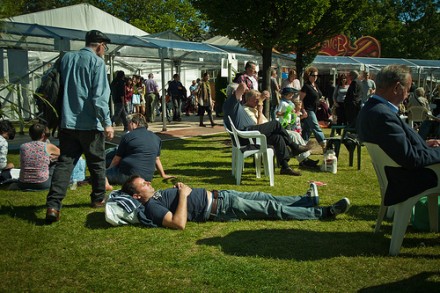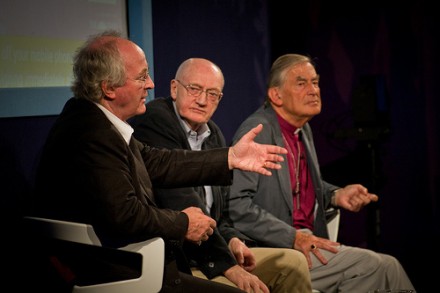The festivals are a crazy thing. You think you’re on top of things and then all of a sudden you only go to your house to sleep, you haven’t seen your flatmate in a week, and you only eat when you are running from one place to another; and that’s all without any partying.
My wish with my Edinburgh International Book Festival coverage was to provide an accurate picture of what it’s like to go to a festival and still have to get up the next day, and in some ways my (lack of) coverage has been quite accurate, because no one has seen me. I run from work to events, sloping in and then dashing off again to help out with work (day work) related projects or to catch one of the few shows I foolishly booked for at the Fringe. I wish that I could wander serene and bookish around Charlotte Square Gardens, notebook in hand, looking all calm and interesting, but I am really never going to be like that. I will always that slightly mad person with the red hair bouncing from one event to the other, looking vaguely stressed out . If you spot me, come say hi. I am not as stressed as I look, promise.
Anyway, here’s the first part of my blast through Charlotte Square this past week, to give you an idea of what it has been like.
OPENING WEEKEND
On Saturday morning the Edinburgh International Book Festival opened its doors for the 21st time. By now a truly grown up festival, it has been given new youth by its latest director, Nick Barley, who took up the reigns in October of last year, and has since been making some radical changes to regular book festival fare.
The first day, however, was classic Book Festival. The Soweto Gospel Choir were singing just inside the entrance to the gardens and the weather was glorious. There were old faces and lots of new ones, and that lovely book festival buzz was definitely doing the rounds.
First up was Garth Nix, Australian author of Lirael, Sabriel and Abhorsen. He put on a great show, and told a lot of stories about his life (most of which turned out to be lies), to teach the kids in the audience that anyone can tell a good story – or a good lie – with the right tools.
It was interesting to go from an event where stories were described as lies to the Philip Pullman event. Pullman was attending the Book Festival to discuss his latest book, The Good Man Jesus and the Scoundrel Christ. The book is divisively published as part of Canongate’s Myth series, which sees well known authors reimagining famous myths.
The Good Man Jesus certainly has Pullman written all over it, and smacks of His Dark Materials, both in tone and ideological bias.
The event featured Philip Pullman in conversation with former Bishop of Oxford Richard Harries, and rock star theologian Richard Holloway. Richard Holloway spoke about faith and the problems of the church at the closing event of last year’s festival, and did so with such intelligence and compassion that it seemed only natural that he would chair this event.
For a discussion that could have so easily disintegrated into argument, Holloway handled the event admirably, instead posing questions that allowed Harries and Pullman to find common ground and expand upon their views for the audience’s benefit.
All three started off in agreement that the figure of Jesus likely existed, but whether this figure was divinely sent is another matter entirely. CS Lewis famously said that Jesus could only be one of two things, God or mad, but Pullman sees this is a foolish dichotomy, and one that can only divide people. Holloway asked: Is it possible to have a non-divine Jesus that is still morally relevant, or are the human and the divine interminably bound together? This is the question that Pullman has tried to answer in The Good Man, providing a moral and human alternative to the traditional gospels of the New Testament.
What I found interesting was Pullman’s openness to discussion and debate, despite the strong moral thwack of his novels. Last year at the festival, we saw Richard Dawkins speak out about the foolishness of religion. Pullman was the opposite. Though he remains opposed to the structures of institutional religion and is sceptical of miracles, Pullman believes that, at the end of the day ‘religion is about the experience’ and so anything that encourages this cannot be a bad thing. To Harries, he said: ‘If my book makes people so cross that they go and read the New Testament, no one could be happier than me.’
All three men come from very different backgrounds, but agreed that the experience of religion is, at the core of it, one’s own, and that very little can or should be done by the church to mediate it. Though part of me wanted to see Harries and Pullman go at it Vatican-style, the end result was much more informative.
















Comments